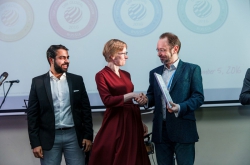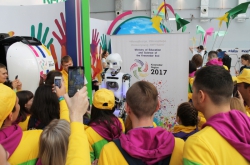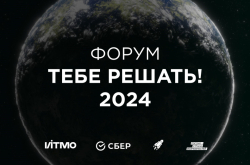The forum started with the signing of cooperation agreements between the NTI competence centers of ITMO University, Skoltech, National University of Science and Technology MISiS, and Technical Committee (TC) ‘Cyber-Physical Systems’. According to the agreements reached, the centers will start engaging in the market and technological expert evaluations, as well as in the creation of technical standards in the field of digital economy and new markets which are in the focus of the NTI’s technology development initiatives.
As the NTI competence centers operate in the markets with no technological rules of the game established as of yet, Russian developers have the opportunity to become leaders in this vanguard sector of the economy, notes Nikita Utkin, Chairman of the TC ‘Cyber-Physical Systems’ and Head of programs at the Russian Venture Company. There are also plans for creating a comprehensive legal framework for technical standardization in the field of quantum communications, artificial intelligence and smart cities by March 2019.
Taking part in the discussion from ITMO University was Advisor to the Rector Oleg Malsagov and Senior Research Associate at the eScience Research Institute Vyacheslav Ilyin.

“NTI centers remove the borders that exist between science and business. ITMO University’s NTI competence center accommodates the work of scientists by commercializing their research and promoting the transfer of technologies,” says Oleg Malsagov. “The challenges the centers face right now are setting and implementing KPIs, finding an effective approach to interacting with major companies, and solving legal issues connected to their status in law.”
According to the experts participating in the forum, NTI centers are hubs of valuable knowledge helping companies boost their excellence, ensuring access to global science, and conducting marketing and business development of inventions. Their interaction with business partners is especially important as the latter generate demand for research projects and identify problems that need to be solved, using such techniques as the establishment of small innovation enterprises, pre-acceleration analysis, pilot testing platforms, and R&D centers.

“The NTI center that exists on the basis of ITMO University focuses on the development of the ecosystem of applied artificial intelligence, including machine learning and cognitive technologies and Big Data. This is one of the fastest-growing fields out there, and as of now both the developers and customers of these cutting-edge solutions often have different understandings of what modern intelligence technologies can and cannot do and how to evaluate their quality in the absence of recognizable standards,” previously noted the Director of School of Translational Information Technologies Alexander Boukhanovsky.
Export of technologies and fostering talent
Special presidential representative on the matters of digital and technological development Dmitry Peskov stated that as the NTI already has a well-developed organizational framework, the community should work on increasing the number of viable startups that will, in his words, feed the big companies or grow big enough to feed on the smaller companies in their environment. Mr. Peskov identified three main areas which the NTI needs to focus on in the field of export: digital platforms and social media, cooperation with the public and private corporations that have established sale charts worldwide, and comfortable legal environments.

Participants of the section exploring issues standing before export accelerators observed the need for creating comprehensive collaboration and sales networks, as well as for developing connections with foreign experts and associations. Also highlighted were the criteria that make exporting successful: manufacturers need to pay special attention to workforce productivity and technical standards in each particular field.
The section dedicated to fostering talent included discussions on the important project such as NTI competition for students, NTI lessons in schools, project schools for regional teams coordinated by NTI leaders, project activity mentoring workshops, and a digital platform for talent management.




